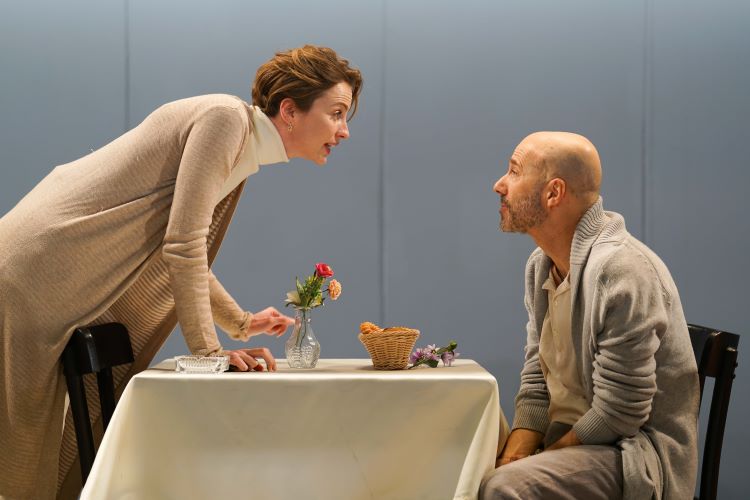
It’s a daunting, if not impossible task to describe the present moment. We are in the midst of it, our sight is limited, and how much more so, our ability to understand. Yet it is also hard to resist the desire to understand and express all that is most urgent, all that is happening, all that we are feeling now. In his striking adaptation of Anton Chekov’s Uncle Vanya, Itai Tiran expresses the feelings of present moment. This very free adaptation of Chekov, directed by Kfir Azoulay, conveys the feelings of hopelessness, loneliness, uncertainty and ennui experienced during the COVID 19 pandemic. The familiar structure of relationships depicted by Chekov provides a framework through which to explore aspects of the collective experience generated by the pandemic, with a contemporary sensibility. It is not Chekov and does not necessarily generate the same feelings as Uncle Vanya, but it does capture the elusive sense of that present moment we all just lived through, and with which we are still reckoning.
The house in the country has been converted into a boutique hotel. Business has never been very good, as Vanya points out – they are not ranked anywhere – but now, with the pandemic and lockdown, there are no guests at all, and they are on the verge of shutting down entirely. The hotel belongs to Aleksandr (Eli Gornstein), a professor of theatre, but it is run by Sonya (Kinneret Limoni) the professor’s daughter by his first wife, and Vanya (Dror Keren), his late wife’s brother. Marina (Miriam Zohar) is the loyal employee who has been with the family forever, and Astrov is the doctor constantly summoned to tend to the illnesses – real and imagined – of the professor. Aleksandr and his beautiful, young wife Yelena (Anastasia Fein) live in the city but are spending the lockdown with the rest of the family in the country.
Aleksandr’s best work and best days are probably behind him, but he conducts himself with a mantle of greatness, wonderfully enhanced by Eli Gornstein’s deep, booming voice. Sonya, Vanya, and Marina are the ones who have been doing the work of maintaining the hotel over the years, sending Aleksandr his share of the income. Miriam Zohar is enchanting and funny as the loyal, down-to-earth Marina. The only one who seems to be truly attached to the hotel, she’s not afraid to speak the truth as she sees it, telling the doctor, Astrov (Yuval Segal) that he’s no longer as handsome as he was in his youth. Sonya is in love with the doctor, but perhaps knowing that he does not share her feelings, remains on the margins of life, not daring to act. Vanya resents his situation in life, offering caustic commentary on everyone else. He yearns for the unattainable Yelena, as does the doctor.
I was most struck by the character of Yelena in the play. In the past, when I’ve seen productions of Chekov’s Uncle Vanya, I hadn’t thought much about Yelena, my focus was primarily on Uncle Vanya and, to a certain extent, Sonya. Anastasia Fein’s outstanding performance made me realize the extent to which I too have internalized the male gaze – I had seen Yelena as the object of desire, a beautiful catalyst of the desires and actions of men. Fein’s nuanced and strong performance brings Yelena into the foreground, a compelling character in her own right. Anastasia Fein brings a warmth, intelligence, and compassion to her portrayal of Yelena, a beautiful young actress who fell in love with her mentor, Aleksandr. She now finds herself living with a fussy, self-important, aging egoist who expects her to cater to his every whim. Yet she is kind to the cranky Aleksandr, enjoys friendly banter with the sharp-tongued Vanya, and even tries to mend fences with Sonya, who is understandably uncomfortable with the fact that her father’s second wife is about her own age.
In my past viewings, I felt that Chekov’s play expressed a deep, abiding, sadness. While Tiran’s adaptation did not generate those feelings, it did convey a different experience, that was very compelling. Leonard Cohen’s Famous Blue Raincoat with its air of regret and lost opportunities, the set with its array of windows that are at once reminiscent of prison bars and empty picture frames that speak of a lost grandeur – all the elements of the play work to express the edgy, restless sense of isolation, loss and uncertainty that many of us have experienced over the past two years. Social distancing, lockdowns, fear and uncertainty have generated for many of us a reckoning with our lives and dreams, a stark assessment of our relationships. Some have found a sense of gratitude for the comfort and support of family and friends, and some were confronted by the difficult truth expressed by Yelena: “You realize how distanced you are from the people who are supposed to be the closest to you.”
Vanya
An adaptation by Itai Tiran to Anton Chekov’s Uncle Vanya
Directed by Kfir Azoulay; Set: Adam Keller; Costumes: Yehudit Aharon; Lighting: Nadav Barnea; Music: Eldad Lidor; Movement: Amit Zamir; Video Art: Nitai Shalem and Sivan Presler; Video Mapping: Erez Schwarzbaum; Director Assistant: Eliana Magon; Producer: Adi Polyak; Cast*: Miriam Zohar (Marina), Yuval Segal (Astrov), Dror Keren (Vanya), Eli Gornstein (Aleksandr), Kineret Limoni (Sonia), Anastasia Fein (Yelena)
*In order of appearance on 11.5.22. The role of Marina is alternated between Miriam Zohar and Elena Yarlova, and the role of Aleksandr is alternated between Eli Gornstein and Rami Baruch





